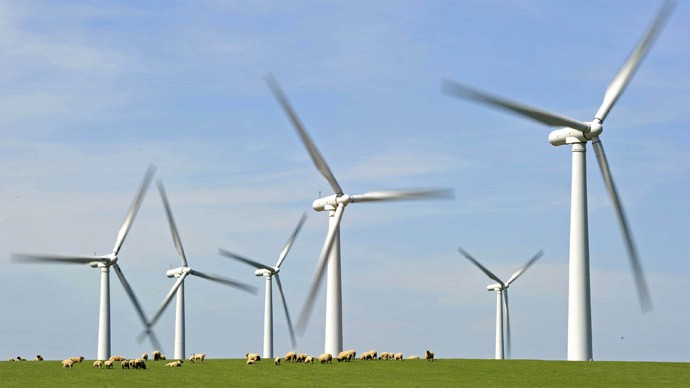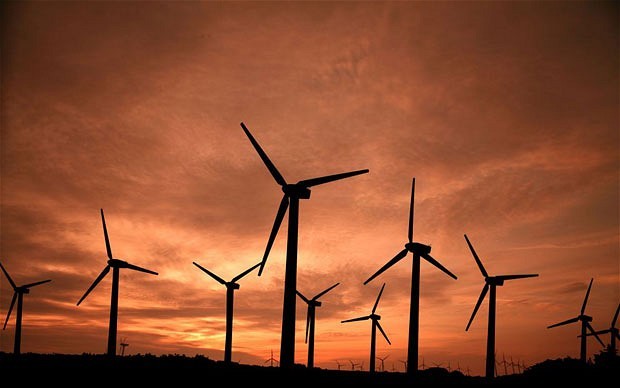UK slips down global green investment rankings
Post on: 16 Март, 2015 No Comment

The UK is rapidly losing the race to be the global powerhouse of the green economy, while other countries streak ahead in low-carbon technology investment and development, according to rankings published on Tuesday.
Last year, the UK slumped from being third in the world in terms of investment in green growth, to only 13th place. according to a report by the respected US Pew Environment Group.
This means the UK now ranks well behind developing countries such as Brazil, in sixth place, India in 10th place and China in first place.
Investment in alternative energy and clean technology reached $11bn (7bn) in the UK in 2009, but plummeted to only $3.3bn (2bn) last year — a decline of 70%. This compares with $2.3bn (1.45bn) investment in Mexico last year, $4bn (2.5bn) in France and $14bn (8.7bn) in Italy. Top of the league is China, with $54bn (34bn), Germany with $41.2bn (25.7bn) and the US, with $34bn (21bn) of investment last year.
The news comes ahead of a crucial cabinet discussion of the UK’s climate change targets beyond 2020. There are still deep divisions between the Department of Energy and Climate Change, which is calling for tough targets to stimulate green growth, and the Treasury and the Department of Business, which argue that the current economic situation calls for less stringent targets in 10 years’ time.
Ministers must decide whether to adopt recommendations made by the Committee on Climate Change, the statutory body that is charged with advising the government on how to meet long-term climate change targets. The committee said last year the UK should aim to cut emissions by 60% by 2030, compared with 1990 levels. A decision should be taken soon on whether to follow that advice, if ministers are to enact the new target into law this autumn, as the Climate Change Act requires.
The Pew report blamed the UK’s fall down the ranking on a sharp decline in offshore wind energy investments and uncertainty surrounding [government] policy.
Phyllis Cuttino, director of Pew’s clean energy programme, said: National policy matters — investment follows policy. We’ve seen that again and again.
Overall, global clean technology investment reached a record $243bn (152bn) last year. Cuttino said it was a landmark, as this was the first year in which investment in renewable energy overtook nuclear power.
This was a big year, she said. Now it’s about keeping up that momentum.

But there was disappointment that the UK had not performed better. Meg Hillier, shadow energy and climate spokeswoman, said: If we do not move fast we will slip back even further, and companies will shut up shop here or go abroad.
Ruth Davis, chief policy adviser at Greenpeace, added: The Conservatives came to power promising to end dithering on energy decisions but instead investors face a continuing atmosphere of uncertainty. With long delays in setting up the green investment bank, further dilly-dallying over when it will be able to function as a proper bank. and a green leal [project to insulate homes] with no sense of direction, we’ve had a year of delays and broken promises. In the mean time green investment elsewhere has surged ahead so we’re losing jobs and industries to other countries. Unless [David] Cameron gives a direct instruction to his Treasury to stop sabotaging his ambitions for the low-carbon economy, British businesses will continue to lose out.
Ahead of the Cabinet discussion, a group of 10 major UK companies including Unilever, Kingfisher, Tesco, Thames Water, EDF Energy and Shell, brought together by the Prince of Wales’ corporate leaders group on climate change, have written to the prime minister, urging him to take a stand.
This target is only credible if there are the right policies and milestones in place to ensure we take adequate action to achieve it between now and 2050. We therefore support the Committee on Climate Change’s call for steady progress towards that goal along a clear trajectory, and would welcome the adoption of a strong fourth carbon budget consistent with a 2030 milestone of at least 60% reductions, and with the proposals in the EU’s 2050 low-carbon roadmap.
They also called for more international action on greenhouse gas emissions from sectors such as aviation and shipping.














